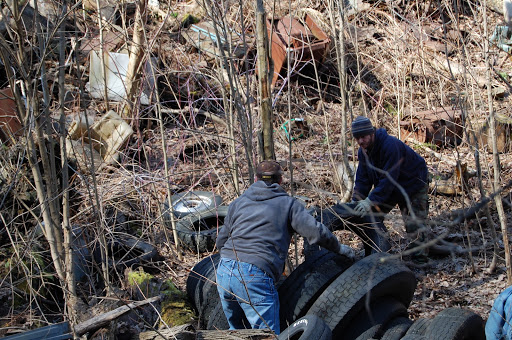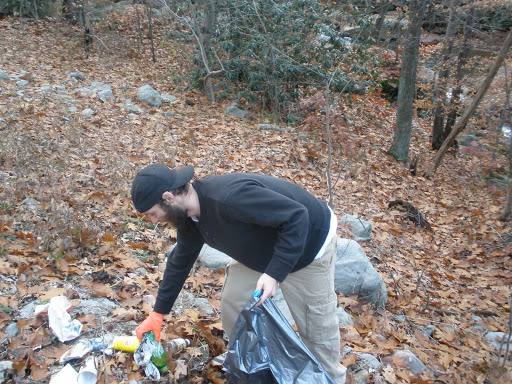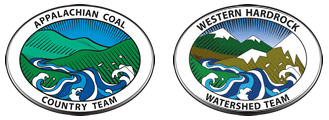Based on the work of
Cumberland Plateau Regional Waste Management Authority
Southwest Virginia
The member counties of Cumberland Plateau Regional Waste Management Authority (CPRWMA) created a system of using people on probation to clean-up illegal trash dumps in exchange for reductions in their fines. The counties first conducted GPS surveys of illegal dump sites in order to create location maps that also indicated dump severity—first level clean-ups which mean light roadside litter, up to third level where large objects have been dumped in hard-to-reach places. With knowledge of the number and severity of dump sites, members could then relate the need for a clean-up system to local governments and secure the support needed to make the system function. Next, they gathered materials and equipment needed to do clean-ups such as gloves, bags, litter poles, dumpster, truck and a winch to haul large objects, Bobcat, etc. They also worked with landowners to get permission to clean-up private property. Litter officers from participating counties met and arranged a clean-up schedule. These clean-ups rotate from county to county weekly. Clean-ups may also involve measures to prevent continued littering, such as constructing dirt berms to prevent roadside dumping and placing hidden cameras to monitor sites.

Tested by
Friends of Deckers Creek
Northern West Virginia
The Deckers Creek watershed is impaired by litter along roadways and illegal trash dumps. Friends of Deckers Creek (FODC) decided that incorporating mandatory service volunteers to help address litter issues within the watershed could be an effective solution. FODC began by meeting with the Monongalia County Probation Office officers, Monongalia Chief Magistrate, and Prosecutor’s Office to explain the project. Making these key officials aware was important in securing mandatory service sentencing for those that would be a good fit for the project, such as youth that would normally be given a fine. With FODC’s litter control mission in mind, officials worked to send volunteers to the organization. Unlike the CPRWMA’s schedule of weekly group clean-ups, FODC developed a method for “signing off” on individual volunteers’ work. Probationers took pictures of areas before and after cleaning and of themselves with the trash collected. Next, they came to the FODC office and reported on their work. FODC staff and volunteers would look over pictures and make a judgment call on whether they were being honest about their time commitment before signing off on completed hours. Some volunteers without a digital camera brought the collected litter to the office. By having volunteers complete all work on their own time, the program was popular amongst probationers with conflicting work schedules and it didn’t require significant amounts of FODC staff time.
Tested by
Friends of Milam Creek
Southern West Virginia
One of Friends of Milam Creek’s (FMC) most pertinent and consistent needs is to keep Milam Creek clean and litter free. FMC hoped that working with mandatory service volunteers through Wyoming County’s Day Report Center would fulfill FMC’s need for trash clean up and initiate a strong partnership for future endeavors. FMC discussed the practice with the Wyoming County Commission and Day Report Center. Both entities committed to organizing a Milam Creek clean-up by mandatory volunteers. After some communication issues due to an intermediary, FMC was able to establish a direct contact at the Day Report Center and clean-ups commenced. Clean-ups were supervised by an FMC volunteer with experience in this type of work. The volunteer also provided transportation when needed and lunch for volunteers. Trash bags and gloves were donated from WV Make-It-Shine Project and FMC provided bug repellent, sunscreen and water. Operations were based out of the FMC office with restroom facilities, phones and safe storage of belongings for volunteers. Four truckloads of trash were collected over three different clean-up events. Each time, FMC had a probationer volunteer group for two to three consecutive days. Each clean-up day lasted from 9am-3pm with one hour for lunch at noon. Three community and nine mandatory service volunteers participated.

“The implementation of this practice could be easier for our watershed group because we are working with a total of 5 miles of creek. For rural watershed groups that encompass more waterways, a stronger and longer commitment would be necessary.”
-Friends of Milam Creek
